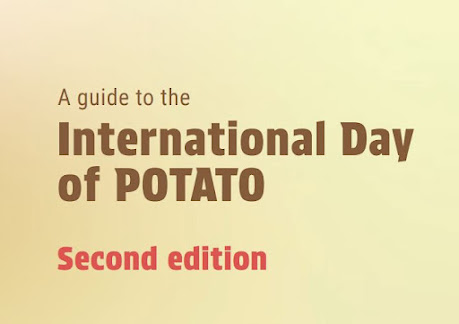FORUM: “Shaping history, feeding the future.” International Day of Potato 2025. The theme of the 2nd observance will acknowledge the potato’s deep historical and cultural significance and its evolving role in today's global agrifood systems. As a staple food for the world’s population, potatoes are rich in carbohydrates, providing a primary source of energy. They also contain several micro-nutrients including B vitamins, vitamin C, folate, potassium, phosphorus, and magnesium. During the day, we spotlight the potato, Solanum tuberosum (L.) – a crop regularly consumed by billions of people. Potatoes are a key crop across diverse farming systems globally, ranging from smallholders producing diverse heirloom varieties by hand in the Andes, to vast commercial, mechanized farms in different continents. Potatoes contribute to the food security and nutrition as well as and livelihoods and employment of people in rural and urban areas the world over. Potatoes are a vital part of the global food system and play a critical role in strengthening world food security and alleviating poverty. The Sustainable production of potato can contribute to all four pillars of food security: availability, access, utilization, and stability. Due to its large genetic diversity, and its current cultivation and demand, potato research and innovation can contribute to sustainable agrifood systems and help to achieve Zero Hunger and the Sustainable Development Goals. Follow the conversations with the hashtags: #30May, #Potato, #InternationalDayOfPotato.
EVENTS: On May 30th; To mark the International Day of Potato 2025, the Food and Agriculture Organization of the United Nations and the International Potato Center (CIP) will host a hybrid event entitled “Shaping history, feeding the future.”; From its domestication in the Andes, to its global spread through the Columbian Exchange and its involvement in key historical events such as the Irish Potato Famine, the potato has shaped civilizations and diets across continents over several millennia. Occurring during FAO’s 80th anniversary year, this second observance will highlight the potato’s contribution to food security, nutrition and livelihoods especially for small-scale farmers. It will also encourage reflections on the crop's production constraints, the need to conserve their diversity, and the desired actions to strengthen its value chain for a more sustainable future. Register to participate!
LIVESTREAM: The Theme "Shaping history, feeding the future" of the second International Day of Potato acknowledges the potato’s deep historical and cultural significance and it's evolving role in today's global agrifood systems. From its origins in the Andes to its global spread, the potato has shaped diets and societies. The day highlights its impact on food security, nutrition and rural livelihoods, while calling for action to address the Potato production challenges, preserve diversity and strengthen it's value chains. Watch the livestream!
PUBLICATIONS: As a global campaign to raise awareness and inspire action has just kicked off, have a look at this selection of FAO publications below to gain better insights into this global common food ahead of the celebration.
- Hidden costs of potato and rice production.
- Climate risk management for the roots and tubers sectors in Africa.
- Strengthening financial services for roots and tubers value chains development in Africa.
- Strengthening linkages between small actors and buyers in the roots and tubers sector in Africa: Cameroon; Uganda.
- Improving access to quality seed potatoes
- Sustainable Approaches to Agro-Processing and Value Chain Development of Root and Tuber Crops in the Caribbean.
- Seed Potato Multiplication to Improve Food Security of The People of Paekam County, Ryanggang Province, Democratic People’s Republic of Korea.
- International Year of the Potato 2008. New light on a hidden treasure..
- Sustainable potato production.
- Conservation and sustainable use of potato germplasm in the rural communities of Andahuaylas.
- Strengthening potato value chains.
- Peruvian “guardians” lead Potato Park to a secure future.
- Costa Rica’s local potato species solve global problems.



No comments:
Post a Comment